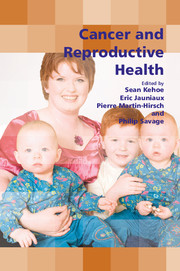Book contents
- Frontmatter
- Contents
- Participants
- Preface
- SECTION 1 Epidemiology, Genetics and Basic Principles of Chemotherapy and Radiotherapy
- SECTION 2 Fertility Issues and Paediatric Cancers
- SECTION 3 Gynaecological Cancers and Precancer
- 9 Management of cervical intraepithelial neoplasia during pregnancy
- 10 Impact of LLETZ on subsequent pregnancies
- 11 Ovarian masses and malignancies
- 12 Cervical and endometrial cancer in relation to pregnancy
- SECTION 4 Diagnostic Dilemmas
- SECTION 5 The Placenta
- SECTION 6 Non-Gynaecological Cancers
- SECTION 7 Multidisciplinary Care and Service Provision
- SECTION 8 Consensus Views
- Index
9 - Management of cervical intraepithelial neoplasia during pregnancy
from SECTION 3 - Gynaecological Cancers and Precancer
Published online by Cambridge University Press: 05 October 2014
- Frontmatter
- Contents
- Participants
- Preface
- SECTION 1 Epidemiology, Genetics and Basic Principles of Chemotherapy and Radiotherapy
- SECTION 2 Fertility Issues and Paediatric Cancers
- SECTION 3 Gynaecological Cancers and Precancer
- 9 Management of cervical intraepithelial neoplasia during pregnancy
- 10 Impact of LLETZ on subsequent pregnancies
- 11 Ovarian masses and malignancies
- 12 Cervical and endometrial cancer in relation to pregnancy
- SECTION 4 Diagnostic Dilemmas
- SECTION 5 The Placenta
- SECTION 6 Non-Gynaecological Cancers
- SECTION 7 Multidisciplinary Care and Service Provision
- SECTION 8 Consensus Views
- Index
Summary
Introduction
Cervical intraepithelial neoplasia (CIN) has a high incidence in the reproductive age groups. The peak incidence of CIN grade III in the UK is at around the age of 30 years, which means that clinicians in colposcopy clinics frequently encounter women with CIN who are pregnant. These cases require considerable experience by the colposcopist and modification of certain principles that apply to the nonpregnant situation.
Cervical smears in pregnancy
The current NHS cervical screening programme (NHSCSP) guidelines recommmend that if a pregnant woman has a regular and negative screening history, cervical smears should be deferred until postpartum. It has been suggested that cervical smears should not be routinely taken in pregnancy because of difficulty in their interpretation — this is due to pregnancy-related inflammatory or reactive changes, which may be revealed on cytology of a cervical smear taken in pregnancy. In addition, cervical sampling in pregnancy can lead to minor vaginal bleeding that can cause anxiety to the pregnant woman. However, there is evidence to suggest that the rate of inadequate smears in the first trimester is low and that smear taking at that time is not associated with adverse pregnancy outcomes such as miscarriage or rupture of membranes. In keeping with this, the NHSCSP guidelines recommend that if the previous test has been abnormal and the woman has since become pregnant, the test should not be delayed.
Keywords
- Type
- Chapter
- Information
- Cancer and Reproductive Health , pp. 111 - 114Publisher: Cambridge University PressPrint publication year: 2008

